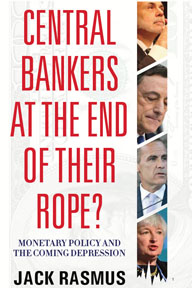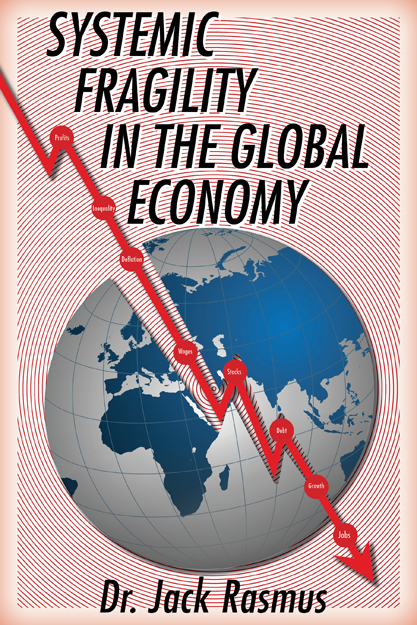COMMENTARY: On September 8 Obama proposed to Congress his ‘fourth program’ in as many years to get the economy going and create jobs for the 25 million who have remained unemployed since he entered office. The latest Jobs Proposal, which should be renamed the ‘Business Tax Expansion Act of 2011’, will cost $447 billion–about half of what has been spent to date on economic stimulus programs since 2009. The latest proposals repeat the reasons why Obama’s prior recovery programs have failed to produce jobs: poor composition (too much tax cuts), bad timing (long term infrastructure spending), and too little in terms of magnitude of spending. Obama’s latest jobs proposal will prove no more effective in creating jobs than his prior proposals. What it will do is give an entry for business and Republican interests to take the tax cut proposals and drive them deeper, giving corporate America even more tax cuts. Meanwhile, Obama is now being led by the nose on two corporate agenda priorities: deficit cutting and more tax cuts. What’s needed is jobs now, that is possible only by direct government job creation patterned on a 21st century Works Progress Administration (WPA) of the 1930s–paid for by a major tax restructuring to take back the trillions the wealthiest households, investors, and corporations have diverted to themselves.
“Obama’s ‘Jobs Act’: Why Less is More of the Same” by Jack Rasmus, September 9, 2011
Last night President Obama proposed a $447 billion Jobs Act. What we got from Obama was a 2009 Stimulus Light proposal, with all the problems of the prior 2009 stimulus package in the form of inadequate magnitude of spending, wrong composition and targets, and bad timing.
First, on the matter of the magnitude of spending in the proposal. Some think it was bold. But put it in context. $447 billion just wont achieve the job creation it claims. Its once again too little for an economy the size of the US, for an economy in as deep an economic hole as it is, and in an economy facing growing downward momentum at home in the context of a global economy also rapidly slipping.
In February 2009 President Obama proposed $787 billion in economic stimulus. Unemployment was about 25 million. More than two years later, after the $787 billion has been spent, unemployment (measured by the Labor Departments U-6 rate) is still around 25 million. Why therefore should Obama’s latest proposals to create jobs, consisting about half the size of the 2009 stimulus, expect to create jobs when the larger stimulus did not?
Even more important than Obama’s jobs acts insufficient magnitude, the composition is also seriously deficient–just as was the 2009 stimulus. Like the stimulus in 2009, it is once again overloaded in tax cuts. In fact, a greater percentage (60%) of the total Jobs Act is composed of tax cuts than was the 2009 stimulus (38%). Then, and now, tax cuts simply cannot and will not create jobs, given the kind of epic recession in which the US economy now finds itself entrapped.
The 38% tax cut mix in 2009 amounted to about $300 billion in total tax reduction. That $300 billion followed a $90 billion tax cut less than mine months before in spring 2008. Another $50 billion in tax cuts was further added later in 2009-10 in various bills and administrative actions. That’s a total of $440 billion in tax cuts. There’s more. Add to that $440 billion another $270 billion in Bush tax cut extensions in late 2010 for 2011, plus another $100 billion in this years payroll tax cut. Now add the Job Acts tax-heavy $270 additional billion. Now were well over a $1 trillion in tax cuts in just the past two years. And whats been the result in jobs? Still 25 million unemployed today as in June 2009.
If someone needs still further evidence that tax cuts dont create jobs in todays environment, just step back a decade. In 2001-04 George W. Bush passed another $3 trillion in tax cuts, overwhelmingly biased again toward the rich and their corporations in the form of capital gains, dividends, inheritance, business depreciation, and other corporate largesse. Over 80% of the $3 trillion went to the wealthiest 20% households and most of that to the wealthiest 5% and 1%. And what kind of job creation resulted? We had the longest jobless recession in US history up to that point. It took 46 months just to recover to the level of jobs we had before the first Bush recession in 2001.
Furthermore, most of the jobs that were created under Bush were in the Finance and Housing sectors of the economy at the time, which were both undergoing a boom due to speculative excesses before an eventual bust. The jobs mostly created in Finance and Housing had little to do with Bush’s tax cuts of 2001-04, however. Instead, millions of jobs were being lost in manufacturing while the tax cuts were taking effect last decade.
In 2004 Bush also pushed through a bill to allow multinational corporations to repatriate their then $700 billion hoard of cash they were keeping offshore in their subsidiaries in order to avoid paying the US 35% corporate tax rate. The multinationals blackmailed Congress to let them pay only 5.25% instead of 35%. In exchange, they said they’d bring back the money (saving 29.75% for themselves) and use it to create jobs. Did they? No. They money brought back was used to buy back their stock, payout more dividends, and to use for mergers and acquisitions that in fact resulted in fewer jobs. Now the same game is being proposed in Congress, except this time their offshore cash hoard is $1.2 trillion.
The historical record of the past decade is clear: tax cuts simply don’t create jobs, especially tax cuts for the rich and corporations. So why has Obama given them $1 trillion in tax cuts the past two years and is now proposing more?
Neither Bush nor Obama policies of tax cuts have created jobs. Big corporations today are sitting on a cash hoard of $2 trilliona result in large part of the nearly $1 trillion in tax cuts of the past two yearsand they arent using it to create jobs. How much more will Corporate America have to be given in tax cuts to finally create jobs? Will another $1 trillion do it? $500 billion? Will the roughly additional $270 billion proposed by Obama yesterday suffice? Whats the magic number in more tax cuts that will finally result in job creation?
But the tax-heavy proposal once again by Obama is not the only problem with his Jobs Act. The Jobs Act shares another similar deficiency with the Presidents prior 2009 stimulus. Its too heavily weighted as well in favor of subsidies to the states. The 2009 stimulus provided $263 billion in subsidies to the states. It was supposed to create jobs. It didn’t. Local government laid off hundreds of thousands of workers since June 2009 despite the $263 billion. What guarantees are there that wont be repeated this when they’re given the added subsidies? Will they get the subsidy only if they first prove they’ve added the jobs? Don’t count on it.
Another problem with the composition of yesterdays Jobs Act announcement by the President is it once again repeats the promise of the 2009 stimulus that infrastructure spending will quickly create jobs. In 2009 about $100 billion was allocated to infrastructure related spending that was supposed to create 4 million jobs. That didn’t happen. There were 6.4 million construction workers employed in June 2009. There are 5.5 million today. Nearly a million fewer construction jobs was the result. There just weren’t as many shovel-ready jobs as was claimed. Construction and infrastructure jobs are long term. What is needed today is immediate job creation. Infrastructure programs just wont cut it. Especially when of the minimal magnitude in Obama’s recent proposal.
Obama yesterday promised his proposals would focus on small business by subsidizing their hiring of workers for each job they create. But for small business to create jobs it needs more than a partial hiring subsidy. It needs funds in addition to cover all the other costs of production. For that small business needs bank loans. And for two years now they just cant get the loans from the big banks. Bank lending to small business declined for 15 consecutive months after June 2009 and its not much better today. Obama and the Federal Reserve bailed out the big banks to the tune of $9 trillion in recent years, in the expectation they would start lending. They didn’t. They still are’nt. Like the big corporations hoarding their $2 trillion and not creating jobs, the big banks are hoarding their cash reserves as well and lending to small business that might create jobs if they could get the loans. Obama would have done better to propose the Federal government bypass the banks and directly loan to small business at 0.25%. After all, that’s the interest rate at which the Fed today loans to the big banks? No, I take that back. Actually its only 0.1%, and then the Fed pays the banks 3% to temporarily park the free money with the Fed in the interim. What a deal: the Fed pays the big banks to take its free money.
In summary, what we got from Obama’s Jobs Act last night was more of the same in terms of poor composition (i.e. excessively tax cut heavy), poor timing (long term infrastructure projects), and too little magnitude spending in any event.
Theres no reason to believe that the Obama jobs package that repeats the problems of poor composition and bad timing of the 2009 stimulus–which didn’ t create jobs–is going to do any better when its also half the size of the stimulus.
Of course, the proposed Jobs Act wont pass anyway because the Teapublicans will oppose it. At best, they might try to cherry-pick out the business tax cuts proposed by Obama, and then add even more tax cuts to the Jobs Act–a proposal which anyway should be appropriate renamed The Business Tax Expansion Act of 2011.
Just a day before the presidents address, the Teapublican candidates gathered to hold their latest debate. They stumbled all over each other to see who could promise Corporate America even greater tax cuts. Rick Perry even promised to end all corporate taxes. Rick Santorum promised to lower capital gains and dividends taxes to zero. Others proposed no income taxes whatsoever for earners of $200,000 income a year. Grovel for those campaign contributions, fellas. These same candidates, after proposing cutting hundreds of billions a year in tax cuts for the rich and corporations, will turn around and cry about the budget deficits and demand equivalent cuts in social security, medicare and Medicaid to make up for their ever-generous handouts to the wealthy.
But this kind of mercenary, Robin-hood in reverse, policy of No taxes whatsoever for the rich and their corporations is expected from the radical right. Yet it seems Obama is being drawn into their tax cut for the rich frenzy with his proposal last night for yet another $270 billion in cuts. He just agreed, less than nine months ago, to give them $270 billion by extending the Bush tax cuts last December. Now hundreds of billions of dollars more. This past year witnessed the Presidents adopting their central agenda demand to cut deficits. Could he now be tailing the Teapublicans once again down the Cut more taxes for Corporate America road as well?
A real job program today would be proposals and programs to re-create, in 21st century form, of a Works Progress Administration–paid for not by giving the rich and their corporations still more tax cuts but by taxing their $2 trillion cash hoard, their $1 trillion in excess free Fed money bank reserves, their $1.2 trillion held in offshore subsidiaries, and by taxing the more than $6 trillion they’ve all stashed away in their tax havens around the globe from the Cayman islands to the Seychelles to Vanuatu and, of course, Switzerland.
Politics in America today sadly is not about what will ensure true economic recovery and give the 25 million Americans a job. Its about how to extend tax cuts for Corporate America and its shareholder beneficiaries; its about how to ensure the Great American Tax Shift of recent decades is never rescinded and instead further extended; and its about how to make everyone else in American pay for their bailouts so that the corporations and wealthiest themselves do not have to.
Jack Rasmus, September 9, 2011
 Dr. Jack Rasmus @drjackrasmus
Dr. Jack Rasmus @drjackrasmus









Yes, extremely well-stated. Plus apparently Obama will “pay for” the plan by cutting SS, Med. and Med. This is a disaster.
My responses to portions of President Obama’s address to the Joint Session of Congress:
http://www.google.com/hostednews/ap/article/ALeqM5i1gC6oaRIAEqAFwFLPaqy12a1aaQ?docId=4516f5e2425f4c7c99451f160a146bcd
REGARDING: The purpose of the American Jobs Act is simple: to put more people back to work and more money in the pockets of those who are working.
RESPONSE: What’s not to like about that?
REGARDING: It will create more jobs for construction workers, more jobs for teachers, more jobs for veterans, and more jobs for the long-term unemployed.
RESPONSE: What are the details?
REGARDING: It will provide a tax break for companies who hire new workers, and it will cut payroll taxes in half for every working American and every small business.
RESPONSE: This reads extremely ominous.
REGARDING: Pass this jobs bill, and starting tomorrow, small businesses will get a tax cut if they hire new workers or raise workers’ wages.
RESPONSE: Whew! Sorry, but I must catch my breath. Well, now that I can breathe, again, I find these concepts extremely infantile and inane, but I will attempt to explain my perceptions. If we have a business with ten employees who are at an 80% capacity, we could, theoretically, lay off two employees, but we are trying to keep our personnel, hoping that we will increase our sales. Will we hire a new employee if we don’t need one? Will we spend $40,000 a year to obtain a tax credit of $5,000-$10,000? I don’t think that would be a rational decision. We will hire an employee when we NEED an employee. A plan that gives a tax credit for new hires is a waste of taxpayers’ resources, since a business will hire only if needing an employee. The exception would be when the tax credit exceeds the cost of the employee. Good luck on that happening. The designers of this “plan” appear to be incompetents, at best.
REGARDING: Pass this jobs bill, and all small business owners will also see their payroll taxes cut in half next year. If you have 50 employees, making an average salary, that’s an $80,000 tax cut.
RESPONSE: Okay, we have found some details, and they happen to be very ominous. Using as estimated 100,000 such businesses and a savings of $30,000 each, that would be a total of $3,000,000,000, which would be a windfall for these businesses, but the effect upon the sales for those businesses would be negligible. These companies would employ about 1,250,000 or about 12-13 per company. The $3 billion would be vastly more stimulative to the economy by increasing the take-home pay of those 1,250,000 workers by $200 per month, thus this portion of the “plan” should be a non-starter. The goal of a plan to rev up the economy must be directed to enhance the energies, within the economy, which can be tapped by all businesses. Whoever designed this portion of the “plan” should be reassigned to some unrelated non-economic function.
REGARDING: It’s not just Democrats who have supported this kind of proposal. Fifty House Republicans have proposed the same payroll tax cut that’s in this plan. You should pass it right away. RESPONSE: If the parameters of the payroll tax reduction are the same as for 2011, they are not appropriate for, at least, two reasons. The reduction in payroll taxes should be permanent and should be treated as an income tax credit, rather than a reduction of Social Security taxes, i.e., the tax credit would equal 6.2% of the first $40,000 of subject income. The concepts are permanence and sufficiency.
REGARDING: Pass this jobs bill, and we can put people to work rebuilding America. Everyone here knows that we have badly decaying roads and bridges all over this country. Our highways are clogged with traffic. Our skies are the most congested in the world. RESPONSE: This reflects the pathetic inactions of Congress, which have left our nation in such a state of disrepair. The concept of “rebuilding American” must be an ongoing, everyday activity, not one that must wait to be included in some “stimulative” plan. The People should and must be outraged at such fiscal nonsense. I will take a deep breath and continue.
REGARDING: This is inexcusable. Building a world-class transportation system is part of what made us an economic superpower. And now we’re going to sit back and watch China build newer airports and faster railroads? At a time when millions of unemployed construction workers could build them right here in America?
RESPONSE: Do I really need to respond to this?
REGARDING: There are private construction companies all across America just waiting to get to work. There’s a bridge that needs repair between Ohio and Kentucky that’s on one of the busiest trucking routes in North America. A public transit project in Houston that will help clear up one of the worst areas of traffic in the country. And there are schools throughout this country that desperately need renovating. How can we expect our kids to do their best in places that are literally falling apart? This is America. Every child deserves a great school — and we can give it to them, if we act now.
RESPONSE: Come on, now! Get serious! Congress can’t do these things and still continue the massive shift of wealth from the middle-class to the top 0.1%, during these past 30 years.
REGARDING: Pass this jobs bill, and thousands of teachers in every state will go back to work. These are the men and women charged with preparing our children for a world where the competition has never been tougher. But while they’re adding teachers in places like South Korea, we’re laying them off in droves. It’s unfair to our kids. It undermines their future and ours. And it has to stop. Pass this jobs bill, and put our teachers back in the classroom where they belong.
RESPONSE: Whereas the goal is solid, triage isn’t the way to achieve this. Just shifting federal funds to the various states will not resolve the problem. All public salaries and benefits must be reduced. The concept is that it is superior to reduce salaries and wages rather than reduce expenses through layoffs. This concept applies to all municipal, state, and federal employees.
REGARDING: Pass this jobs bill, and companies will get extra tax credits if they hire America’s veterans. We ask these men and women to leave their careers, leave their families, and risk their lives to fight for our country. The last thing they should have to do is fight for a job when they come home.
RESPONSE: Depending upon the details, this appears to be rational.
REGARDING: Pass this bill, and hundreds of thousands of disadvantaged young people will have the hope and dignity of a summer job next year. And their parents, low-income Americans who desperately want to work, will have more ladders out of poverty.
RESPONSE: Whereas the goals are, absolutely, worthy, my guess is that the logistics may suck (a technical economic term). I recommend that all minimum wage laws be repealed. Further, I recommend a massive expansion of the earned income tax credit program (EITC), which would apply to U.S. citizens and those with green cards who are over the age of 17.
REGARDING: Pass this jobs bill, and companies will get a $4,000 tax credit if they hire anyone who has spent more than six months looking for a job. We have to do more to help the long-term unemployed in their search for work. This jobs plan builds on a program in Georgia that several Republican leaders have highlighted, where people who collect unemployment insurance participate in temporary work as a way to build their skills while they look for a permanent job.
RESPONSE: Just more attempts at triage. All energies should be expended upon the macroeconomics. The derivatives such as unemployment, deficits, debt, stock market prices, real estate prices, et cetera will be benefited.
REGARDING: The plan also extends unemployment insurance for another year. If the millions of unemployed Americans stopped getting this insurance, and stopped using that money for basic necessities, it would be a devastating blow to this economy.
RESPONSE: Absolutely.
REGARDING: And here’s the other thing I want the American people to know: the American Jobs Act will not add to the deficit. It will be paid for. And here’s how:
The agreement we passed in July will cut government spending by about $1 trillion over the next ten years. It also charges this Congress to come up with an additional $1.5 trillion in savings by Christmas. Tonight, I’m asking you to increase that amount so that it covers the full cost of the American Jobs Act.
RESPONSE: “And here’s how”? DOA? This is the “funding” logistics? LOL, big time!! I am still laughing. Yes, tears and all.
REGARDING: And a week from Monday, I’ll be releasing a more ambitious deficit plan — a plan that will not only cover the cost of this jobs bill, but stabilize our debt in the long run. RESPONSE: Boy oh boy oh boy!!! I am at a loss for further comments, at this point in time. These last two are replete with ambiguities, and ambiguities are not good. Sadly, I am no longer laughing.
Since this “plan”, to this point of review, appears to be destined for about a 90% revision, I will end my critique.
Listening to his Address, I liked it. His delivery was excellent. Was I too tired or weakened by the presentation? I don’t know.
Very frustrated, dismayed, and shocked (please forgive any confusion, since I don’t have the energy or will to review my responses),
mz 09/08/11
“Big corporations today are sitting on a cash hoard of $2 trillion, a result in large part of the nearly $1 trillion in tax cuts of the past two years and they aren’t using it to create jobs.” I read the report from Northeastern Univ., Andrew Sum and others, Who Has Benefitted from the Post-Recession Recovery?, July 2011. He shows that corporate profits since June 2009 are up by almost $500 billion, from $1.2 trillion to almost $1.7 trillion. He also says that over 92% of growth in GDP came as a a result of this surge. Part of the corporations’ profit increase has to do with having more than 7 million fewer employees to pay, and part has to do with this tax relief that you mention. But is either part a true indication of increased economic output, GDP, and a rising GDP number? Is the recovery, since June 2009, just an accounting fiction? Maybe this question is too dumb for an answer.
Also, from 1933-1937 the unemployment rate dropped from 25% to 9.6% according to Marshall Auerback, New Deal 2.0, August 30, 2010. I just wonder what you think about those figures. He bases them on a BLS methodology change in counting unemployment that occurred in 1940, deriving from some academic paper in the 1970s, I think. I wonder what you think. Another question. Great article about O’s speech which I did not listen to. Ay Caramba!
REGARDING: Furthermore, most of the jobs that were created under Bush were in the Finance and Housing sectors of the economy at the time, which were both undergoing a boom due to speculative excesses before an eventual bust. The jobs mostly created in Finance and Housing had little to do with Bush’s tax cuts of 2001-04, however. Instead, millions of jobs were being lost in manufacturing while the tax cuts were taking effect last decade. RESPONSE: You are 100% correct. The energy of the first 6-7 years of the first decade was due to the “funny money” that was created when the Fed, precipitously, reduced short-term rates in 2001.
REGARDING: Obama yesterday promised his proposals would focus on small business by subsidizing their hiring of workers for each job they create. But for small business to create jobs it needs more than a partial hiring subsidy.
RESPONSE: This is inane, at best. No business will hire an employee for $40,000 per year to receive a $10,000 tax credit. This, if passed, should be characterized as theft from the taxpayers. It will not produce any jobs, but will benefit those companies that were going to hire employees that they needed, regardless of a tax credit. Inane, theft, irresponsible, infantile….
REGARDING: It needs funds in addition to cover all the other costs of production. For that small business needs bank loans. And for two years now they just cant get the loans from the big banks. Bank lending to small business declined for 15 consecutive months after June 2009 and its not much better today. Obama and the Federal Reserve bailed out the big banks to the tune of $9 trillion in recent years, in the expectation they would start lending. They didn’t. They still aren’t.
RESPONSE: A company needs DEMAND for its goods and services. If a company can show that demand (if profitable), a bank would be happy to lend the necessary funds.
REGARDING: Obama would have done better to propose the Federal government bypass the banks and directly loan to small business at 0.25%. After all, that’s the interest rate at which the Fed today loans to the big banks? No, I take that back. Actually its only 0.1%, and then the Fed pays the banks 3% to temporarily park the free money with the Fed in the interim. What a deal: the Fed pays the big banks to take its free money.
RESPONSE: There is great merit to this idea IF the same qualifications for a loan would apply. There is even a greater fiduciary responsibility when taxpayers’ funds are involved.
mz
mikiesmoky@aol.com